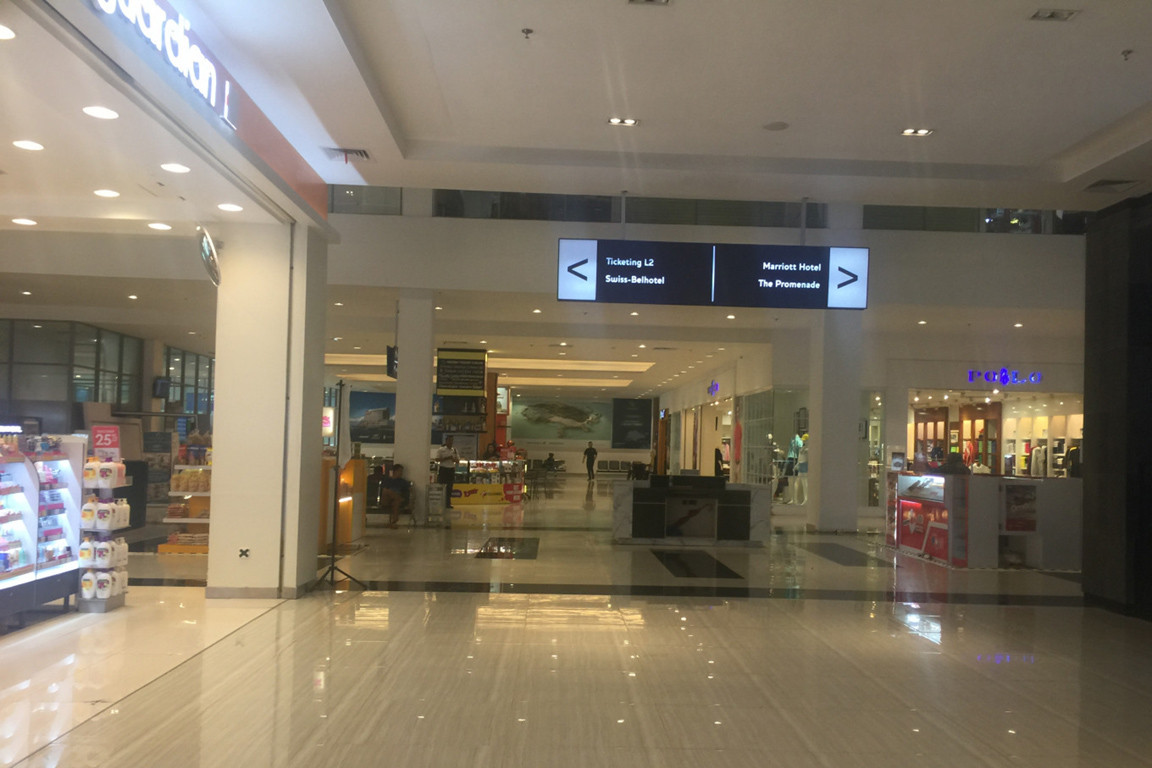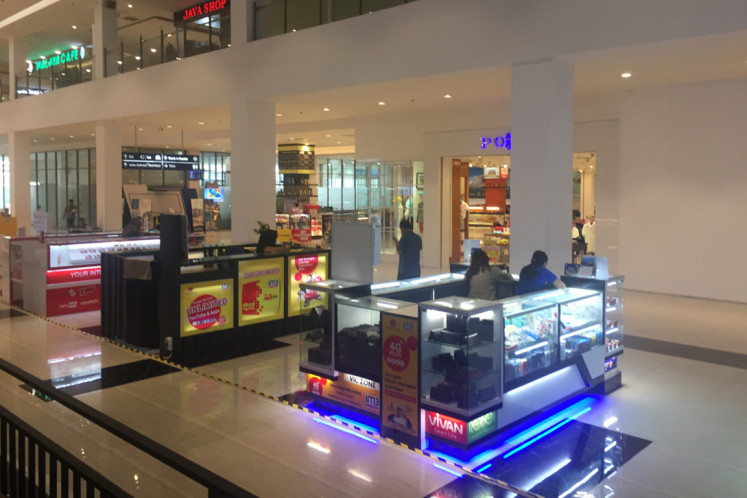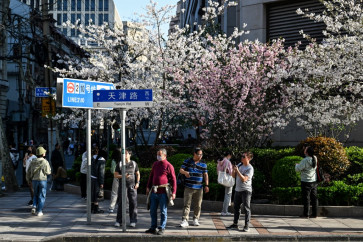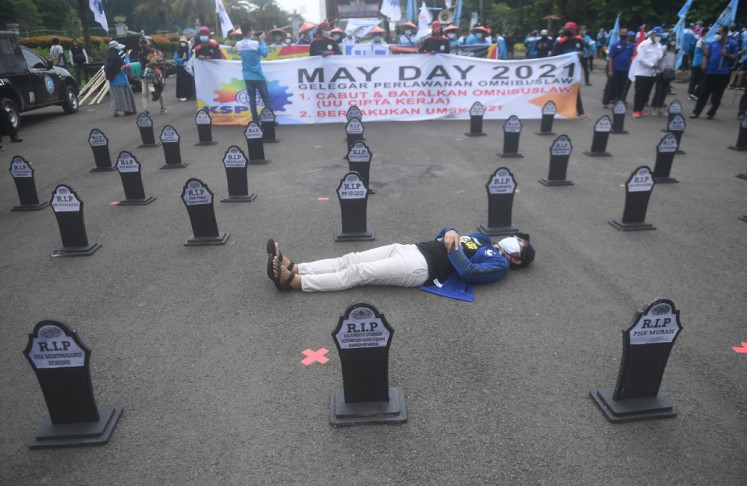In Singapore’s neighbor Batam, malls empty, ferry trips reduced as virus fears lurk
Ferry operators serving the Batam-Singapore route have reduced the number of trips as only a few passengers embark. The same is apparent on ferry routes bound for Johor Bahru, Malaysia.
Change Size
 Harbor Bay shopping center and international ferry port looks a lot quieter than usual on March 7 as visitors from Singapore are dwindling because the COVID-19 coronavirus makes them afraid of travel. The shopping center is within walking distance of the Harbor Bay International Ferry Port Batam, which takes passengers on a one-hour trip to Singapore. (JP/Fadli)
Harbor Bay shopping center and international ferry port looks a lot quieter than usual on March 7 as visitors from Singapore are dwindling because the COVID-19 coronavirus makes them afraid of travel. The shopping center is within walking distance of the Harbor Bay International Ferry Port Batam, which takes passengers on a one-hour trip to Singapore. (JP/Fadli)
W
ithin walking distance of the Batam Center ferry port, which connects Indonesia and Singapore through a one-hour boat ride, the Mega Mall Batam Center looks a lot quieter than usual.
What used to be a view of cars competing to find parking spots is now a vacant lot. This is the most favorite stopover for Singaporeans who visit Batam to buy what they need before going back home across the Singapore Strait.
However, the game changed at the end of January, when Singapore announced its first COVID-19 coronavirus case and embarked on an extensive public health emergency campaign, including travel restrictions and self-quarantine requirements after trips.
Shipowner business representative Asmadi said four ferry operators serving the Batam-Singapore route have reduced their crossing numbers as only a few passengers embark. The same is apparent on ferry routes bound for Johor Bahru, Malaysia.
“Normally for every trip a ferry boat carries at least 50 people, now it’s only 20 people,” Asmadi, the chairman of Indonesian National Shipowners Association’s (INSA) Batam chapter, told The Jakarta Post.
“All ferry operators are reducing their trips. Operational costs are high while the numbers of passengers have dropped drastically.”
Read also: Batam quarantines 15 people who had close contact with Singaporean COVID-19 patients
Ferry operators in Batam on average make 30 trips daily between the city and Singapore, a number that has been reduced to half today. The ferries dock at the Batam Center international port, Sekupang international port, Batu Ampar Harbour Bay, Nongsa Point Marina and Marina City.
Singapore has so far detected 160 cases, of which 93 have been discharged, with no deaths. It is intensifying prevention, testing and care efforts to avoid further spread of the virus, including by restricting entry by visitors from China, South Korea, Iran and northern Italy.
If the condition continues to persist, in the next one or two months ferry operators are likely to lay off some of their 1,000 workers, including ferry crews and their onshore staff.
“Layoffs are within sight, although until today there has been no staff grounded or had their contract cut, but income has severely dropped,” said Asmadi.
Riau Islands, with more than 1,000 islands that host the city of Batam, places second for foreign tourist arrivals, after Bali. In 2019, Riau Islands attracted 2.59 million visitors, almost half of which (47 percent) are from Singapore. China comes in second providing Riau Islands with foreign tourist arrivals, accounting for 10 percent with 260,000 people.
Batam contributed almost three quarters of Riau Islands foreign tourist arrivals at 1.76 million, followed by Bintan at 575,000 and Tanjungpinang at 154,000.
Read also: More than 12,000 flights canceled in two months over virus fears, says Angkasa Pura I
With fewer people visiting Batam, workers like Melati, a therapist at First Choice spa, massage and reflexology in the dense city center of Batam, suffer the most disadvantages.
“My income depends on how many customers I serve. If it continues like this it will be difficult to survive,” said Melati, who can normally handle five to six customers daily, mostly Singaporeans.
Today she’s lucky to serve one customer in a day, Batam locals.
Her manager Yanti Lie said the spa, massage and reflexology center has been forced to cut salaries for non-therapist employees such as herself.
“We understand the situation. Our salaries were cut because there have been no customers. We have been dependent on Singaporean, Korean or Chinese tourists who enter from Singapore,” said Yanti.
The massage center normally thrived on tourist groups that could visit the place bringing 30 to 50 customers at once.
“Now we are really counting on the locals. Even when we give 50 percent discounts there’s just no customers,” Yanti added.

There has as yet been no official data released on how severely the COVID-19 coronavirus is affecting the economy of Batam, which is supported by the manufacturing industry and tourism sectors, but there has been indication of a slowdown in the economy by way of a deflation recorded in February 2020.
The Riau Islands in February saw 0.16 percent deflation on a monthly basis from January. That compares with a month-to-month nationwide inflation rate of 0.28 percent in February and also with the province’s 0.18 percent inflation recorded in January. Airplane costs, chicken and red chili prices contributed to Riau Islands’ deflation in January.
Read also: Singaporean man earlier suspected of COVID-19 buried in Batam
Meanwhile, the electronics manufacturing industry may well be the last line of defense, but production has been disrupted by a suspension of raw material supplies from China since January.
Batam’s Batamindo Industrial Park general manager Mook Sooi Wah said half of the 68 factories in the industrial park depend on raw material from China.
“There are two options to consider: first, seek supply alternatives from other countries apart from China; second, stop operations. Looking for an alternative supply is not an easy and quick task to do,” Mook told the Post.
Raw materials used for production at the Batamindo Industrial Park come from various countries around the world, but China accounts for 70 percent.
A source at another industrial park said Singapore’s Economic Development Board (EDB) has paid attention to Batam’s manufacturing industry situation, sending a letter to industrial parks asking for clarifications and the options being considered to tackle the issues.
“Meanwhile our government has yet to reach out about the problems we’re facing amid the coronavirus,” the source told the Post.
The government is to soon launch another stimulus package to ensure a smooth supply of raw materials for the country’s manufacturing sector amid the widespread impacts of the coronavirus on the global market.
“About 20 to 30 percent of the raw materials for the country’s industries engaged in plastic, textile and steel production are sourced from China. For some other industries, the raw materials from China could reach 50 percent,” Sri Mulyani told the press at the Presidential Palace in Jakarta on March 4. (est)









